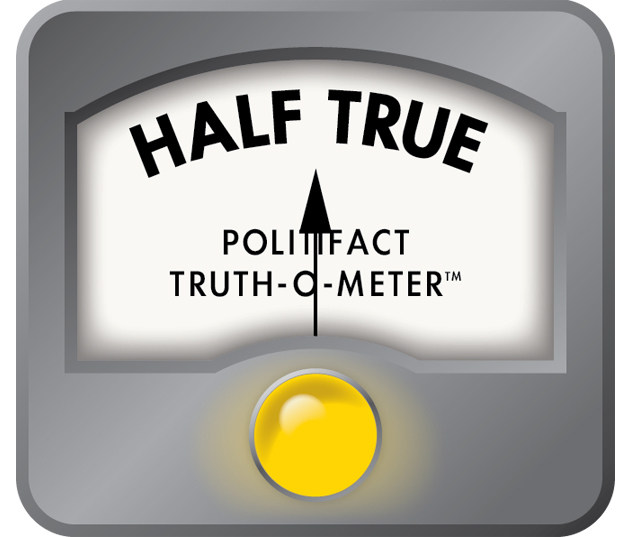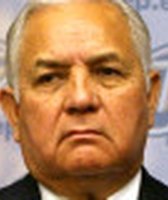Stand up for the facts!
Our only agenda is to publish the truth so you can be an informed participant in democracy.
We need your help.
I would like to contribute
Donald Trump says caravans of people coming through Mexico to cross U.S. border
In a tweet, President Donald Trump ruled out a deal to restore a program protecting certain young immigrants from deportation in part by warning that the Mexico-U.S. border could soon be besieged by a pile of people.
Trump said April 1, 2018: "Border Patrol Agents are not allowed to properly do their job at the Border because of ridiculous liberal (Democrat) laws like Catch & Release. Getting more dangerous. ‘Caravans’ coming. Republicans must go to Nuclear Option to pass tough laws NOW. NO MORE DACA DEAL!"
The tweet folded in familiar terms. "Catch and release" refers to the practice of releasing immigrants apprehended at or near the border, expecting them to appear later before a U.S. immigration judge. DACA stands for the Trump-rescinded Deferred Action for Childhood Arrivals program created on President Barack Obama's watch to shield hundreds of thousands of young immigrants from deportation.
We focused this fact-check on Trump’s fresh statement that "caravans" are coming our way, presumably from south of the Texas-Mexico border.
To our inquiry, a White House spokesman, Steven Cheung, said by email that there have been such caravans in the past and estimates indicate there are 1,000 individuals participating in the caravan Trump had in mind.
A Fox News discussion
Cheung didn't provide more detail. But before the president tweeted, a Fox News program the same morning featured a discussion of a caravan headed toward the U.S. through Mexico.
CNN reported April 1, 2018: "Trump appears to be referring to a migrant caravan assembled by the group Pueblo Sin Fronteras (People without Borders), which was discussed on Fox News' ‘Fox & Friends’ shortly before he published his tweet. It's not known if the President watched the specific segment, but he indirectly referenced claims mentioned in an on-air interview with a Border Patrol union representative."
Similarly, a news story in The Washington Post pointed to the described caravan as the likely basis of Trump’s concern. The Post story took note that a leader of the National Border Patrol Council, which says it represents some 18,000 Border Patrol agents and support personnel, had been interviewed on the Fox News program. Afterward, the council asserted in a web post that Trump’s tweet was referring to a large group of immigrants making their way to the U.S. border.
In the Fox News segment, the council’s president, Brandon Judd, was asked how the Border Patrol would react to the group eventually arriving at the border. Judd responded that a Mexican government entity was helping the group proceed and Pueblos Sin Fronteras, a U.S. group, also was helping. Judd said that once the people made it across the border, each one could request political asylum before getting released by authorities and then not showing up later for an immigration hearing.
News stories confirm caravan entered Mexico
Fox News’s report was accompanied by a photo tweeted by Adolfo Flores, national security correspondent for BuzzFeed News, who reported from Mexico March 30, 2018, that hundreds of men, women and children had crossed into Mexico from Central America and were moving north--1,200 as of the group’s first night in Mexico, the story said.
BuzzFeed’s story said:
"For five days now hundreds of Central Americans — children, women, and men, most of them from Honduras — have boldly crossed immigration checkpoints, military bases, and police in a desperate, sometimes chaotic march toward the United States. Despite their being in Mexico without authorization, no one has made any effort to stop them.
"Organized by a group of volunteers called Pueblos Sin Fronteras, or People Without Borders, the caravan is intended to help migrants safely reach the United States, bypassing not only authorities who would seek to deport them, but gangs and cartels who are known to assault vulnerable migrants."
As of March 30, the story said, the caravan had made it to the southern Mexico state of Oaxaca but it wasn’t immediately successful getting participants onto a freight train heading north. Oaxaca, the state’s capital, is more than 900 miles from Laredo, Texas on the border.
Buzzfeed’s story also said: "While there are organizers from Pueblos Sin Fronteras leading the way, much of the effort to get to the U.S. border is in the hands of the migrants themselves." Also, the story says that according to organizers, about two-thirds of people are planning on crossing into the U.S. "undetected or asking for some type of protection like asylum."
Caravan spokesman: Not everyone will cross U.S. border
That's not what we heard from Irineo Mujica Arzate, a Pueblos Sin Fronteras press contact who told us he was speaking to us from the caravan itself.
Arzate said in a phone interview April 2, 2018 that the group helped organize two caravans in 2017 but, he said, there’s only the existing caravan planned for 2018.
Arzate said that he doesn’t expect every member of the caravan to cross the U.S. border. Most will try to stay in Mexico, Arzate said, with about 200 to 300 individuals ultimately crossing the U.S. border to seek asylum--a forecast that we found to be far short of published forecasts. "We’re trying to do it in a sensible way," Arzate said.
Pueblos Sin Fronteras says on its website that for 15 years, "members have been reaching out to the most vulnerable immigrants in the United States and to migrants and refugees on the move." Members, the group says, "accompany migrants and refugees in their journey of hope."
On its site, Pueblo Sin Fronteras calls the caravan the "Via Crucis," or Stations of the Cross, march. Our search of the Nexis news database yielded an April 2015 news story from the Malaysian national news service, Bernama, of a march that year from Mexico's southern border to Mexico City. According to the story, the "Via Crucis" name draws a parallel between the suffering Jesus endured and the ordeal experienced by migrants.
News stories indicate a planned 2018 stop in Central Mexico
Our search of the Nexis database for other news stories about the caravan turned up another account of the 2018 arrivals into Mexico. Noticias Financieras said in a March 26, 2018, story that nearly 1,500 people fleeing poverty and violence in Honduras, El Salvador, Nicaragua and Guatemala had entered Mexico--with the majority hoping to reach the U.S. border to be considered as refugees.
Also, a March 26, 2018, story posted on SplinterNews.com, which describes itself as news and opinions that get under your skin, specified that the 1,500 people who entered Mexico would seek asylum in the U.S. after a month-long journey. The story quoted Rodrigo Abeja, described as a Mexico-based organizer with Pueblo Sin Fronteras, expressing surprise at the turnout. Abeja said the group’s caravans in 2017 drew about 450 migrants, the story said.
Then again, several accounts mentioned plans for caravan members to seek legal advice at a gathering in Puebla, in central Mexico. According to a fact-check from the Associated Press, posted the day after Trump tweeted, the caravan was scheduled to end later in April in Puebla, which is some 650 miles from the U.S. border. "After the formal caravans end," the AP story said, "some migrants do try to reach the U.S. border, but often just to turn themselves in and request asylum."
Our ruling
President Trump tweeted that caravans of immigrants are coming to the Mexico-U.S. border.
We confirmed that a caravan of 1,200 to 1,500 people from Central America--not caravans--was in southern Mexico, about 900 miles from the Rio Grande, when Trump tweeted. Also, accounts vary on whether all participants are bound to enter the U.S. An organizer estimated that most of the people intend to remain in Mexico.
On balance, we rate this claim Half True.
HALF TRUE – The statement is partially accurate but leaves out important details or takes things out of context. Click here for more on the six PolitiFact ratings and how we select facts to check.
Our Sources
Tweet, President Donald Trump, 8:56 a.m. April 1, 2018
Story, "Fact-checking Donald Trump’s tweets about the border, DACA," PolitiFact, April 2, 2018
News story, "Immigrant 'caravan' heading to US-Mexico border sparks Trump's concern," CNN, April 1, 2018, updated 3:36 a.m. April 2, 2018
News story, "Why U.S.-bound ‘caravans’ of Central American migrants are getting Trump’s attention," The Washington Post, 6:16 p.m. April 1, 2018
Web post, "President Trump responds via Twitter to National Border Patrol Council President Brandon Judd’s interview regarding a caravan of immigrants headed to the U.S. Border," National Border Patrol Council, April 1, 2018
News report, "Border Patrol reaction to caravan of immigrants headed to US," Fox News, April 1, 2018
News story "A Huge Caravan Of Central Americans Is Headed For The US, And No One In Mexico Dares To Stop Them," BuzzFeed News, March 30, 2018, updated March 31, 2018 (accessed April 2, 2018)
Phone interview, Irineo Mujica Arzate, Pueblos Sin Fronteras, April 2, 2018
Fact-check, "Trump assails Mexico, Amazon, twisting facts," The Associated Press, April 2, 2018
Web pages, Pueblos Sin Fronteras, "Refugee Caravan 2018," "Members," "About us," undated (accessed April 2, 2018)
News story, "1,500 Central Americans participate in Viacrucis," Noticias Financieras, March 26, 2018 (Nexis news search April 2, 2018)
News story, "A 'Refugee Caravan' Is Headed to the U.S. and Getting Bigger Every Day," Splinter News, March 26, 2018
News story, "Migrants March Toward Mexican Capital To Demand Migrants' Rights," Malaysian Government News, April 15, 2015 (Nexis news search)
Email, Steven Cheung, special assistant to the president, director of strategic response, The White House, April 2, 2018
Browse the Truth-O-Meter
More by W. Gardner Selby
Donald Trump says caravans of people coming through Mexico to cross U.S. border
Support independent fact-checking.
Become a member!
In a world of wild talk and fake news, help us stand up for the facts.





 PolitiFact Rating:
PolitiFact Rating: 







































